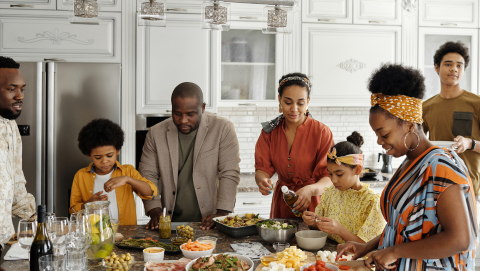Did you know that your diet can impact your mental health during the Holiday Season?
By Ina Wells, MPH Student HEART Initiative Volunteer; Ashley Yaugher, HEART Faculty; Gabriela Murza, HEART Faculty
The holiday season is here, which can either be a happy occasion filled with joy, or it can be a struggle for some. According to the National Alliance on Mental Illness (NAMI), 64% of people in the U.S. with mental health disorders reported holidays make their conditions worse and can bring feelings of sadness/dissatisfaction, financial stress, and loneliness (NAMI, 2020). This is not only specific to the U.S. In 2018, a survey in the United Kingdom found that 31% of people felt sad or upset during holiday times, and 18% of individuals had lost their temper with family members or loved ones (Statista Research Department, 2022).
An IPSOS 2023 Global Health Service Monitor survey found 53% of U.S. respondents reported mental health as the biggest health issue that they are currently facing (Fleck, 2023). This increased from August 2022 and now exceeds other health issues of concern, including obesity, cancer, stress, and the coronavirus (Fleck, 2023). The most common mental health disorder is anxiety (Aucoin et al., 2021). In 2022, a survey found that 33% of adults in the U.S. stated they always or often felt anxious in the past 12 months, followed by depression and then loneliness at 21% (Vankar, 2022). When it comes to the holidays, loneliness can lead to the “Holiday Blues” during Thanksgiving all the way to New Year’s (NAMI, 2020). If these symptoms last more than two weeks, it can lead to clinical levels of anxiety and/or depression (NAMI, 2020).
There are many suggestions on what we can do to help manage our mental wellbeing, one being diet. Research has found a strong association with diet and anxiety, and depressive disorders (Aucoin et al., 2021; Gibson-Smith et al., 2020). Changing the way we eat to a healthier eating pattern, such as the Mediterranean Diet, can help to potentially decrease symptoms of anxiety and/or depression (Kris-Etherton et al., 2020). The opposite has been found when individuals consumed energy-dense foods high in added sugars and saturated fats (Aucoin et al., 2021; Kris-Etherton et al, 2020).
It's understandable that during the holiday season it may be difficult to avoid all of those high fat and sugary foods, but small changes can make a difference. For example, eating one cookie instead of three cookies, adding more vegetables to your plate to feel full, and having one day be a meatless day. Avoiding alcohol, opioids, and other nervous system depressants, especially when you are feeling sad or lonely, helps manage mental health as well (NAMI, 2020).
To help support you on establishing an overall healthier you, consider consulting a registered dietitian/nutritionist (RDN). RDN’s can be a wonderful addition to your support group that you may or may not already have set in place. They can provide you with additional resources and/or references and create a personalized nutrition plan. Start your search for an RDN at the Academy of Nutrition and Dietetics website eatright.org. If not this year, then make it a New Year’s resolution! The key is to start small and build on nutrition skills as you go. Enjoy the holidays!
References:
- National Alliance on Mental Illness (NAMI). (2020). Maintaining mental health during the holiday season. https://namica.org/blog/handling-stress-during-the-holiday-season/
- Statista Research Department. (2022). Mental health problems experienced during Christmas in the United Kingdom in 2018. Statista. https://www.statista.com/statistics/950882/mental-health-problems-christmas-uk/
- Fleck, A. (2023). Mental health is the top health concern among Americans. Statista. https://www-statista-com.dist.lib.usu.edu/chart/30995/biggest-health-concerns-among-americans/
- Aucoin, M., LaChance, L., Naidoo, U., Remy D., Shekdar, T., Sayar, N., Cardozo, V., Rawana, T., Chan, I., & Cooley, K. (2021). Diet and anxiety: A scoping review. Nutrients, 13(12), 4418. doi: https://doi.org/10.3390/nu13124418
- Vankar, P. (2023). Anxiety, depression, loneliness among U.S. adults, 2022. Statista. https://www.statista.com/statistics/1384139/anxiety-depression-loneliness-us/
- Gibson-Smith, D., Bot, M., Brouwer, I.A., Visser, M., Giltay, E.J., & Penninx, B.W.J.H. (2020). Association of food groups with depression and anxiety disorders. Eur JNutr, 59, 767-778. doi: https://doi.org/10.1007/s00394-019-01943-4
- Kris-Etherton P. M., Petersen, K.S., Hibbeln, J.R., Hurley, D., Kolick, V., Peoples, S., Rodriguez, N., & Woodward-Lopez, G. (2020). Nutrition and behavioral health disorders: depression and anxiety. Nutrient Reviews, 79(3), 247-260. doi: 10.1093/nutrit/nuaa025
- Academy of Nutrition and Dietetics. (2023). Find a nutrition expert. https://www.eatright.org/find-a-nutrition-expert


 Utah 4-H & Youth
Utah 4-H & Youth